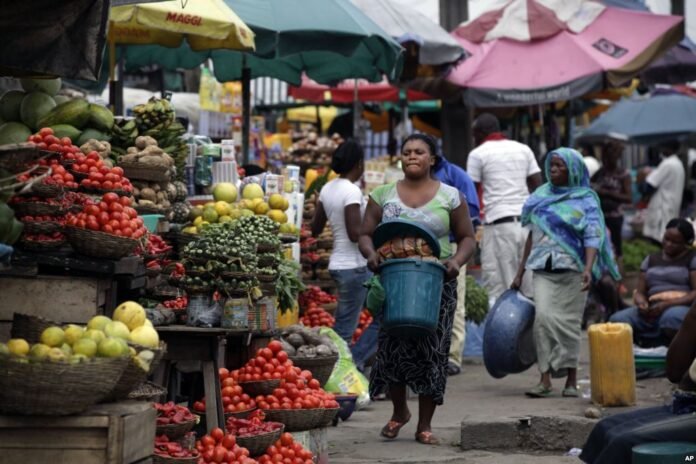Nigeria’s food inflation is on the brink of surpassing the 40% mark, as new data from the National Bureau of Statistics (NBS) reveals a further rise in consumer prices for November 2024. Experts attribute the surge to persistent structural challenges, escalating transportation costs, and festive season demand pressures.
Rising Inflation: Key Highlights from the NBS Report
The Consumer Price Index (CPI) report released by the NBS highlights a concerning trend in Nigeria’s inflationary environment:
- Headline Inflation Rate: Rose to 34.6% in November 2024, up from 33.88% in October 2024, representing an increase of 0.72 percentage points.
- Food Inflation Rate: Surged to 39.93%, marking a sharp increase of 0.77 percentage points from 39.16% recorded in October.
- Year-on-Year Headline Inflation: Increased by 6.4 percentage points compared to November 2023’s figure of 28.2%.
On a month-on-month basis, the headline inflation rate stood at 2.6% in November, slightly lower than October’s 2.64%.
Key Drivers of Food Inflation: The NBS identified significant price hikes in staple food items, particularly:
- Tubers: Yam, water yam, and coco yam.
- Grains: Guinea corn, maize, and rice.
- Oils and Fats: Palm oil and vegetable oil.
- Cereals and Bread: Critical food staples like rice and bread.
- Other Commodities: Seasonal items driven by festive demand.
Why is Food Inflation Escalating?
Economic analysts and experts have outlined three major factors driving the relentless rise in food prices:
1. Structural Constraints in Food Production
Nigeria’s food production continues to suffer from systemic issues, particularly in the northern agricultural regions. Key challenges include:
- Security Issues: Persistent banditry and insurgencies in northern states have disrupted farming activities and supply chains.
- Flooding and Climate Change: Erratic weather patterns, flooding, and droughts have impacted agricultural productivity.
- Lack of Infrastructure: Poor transportation networks and storage facilities exacerbate post-harvest losses.
2. Festive Season Demand Pressures
With the approach of the December festive season, demand for food staples traditionally spikes. Households and businesses stock up on essential food items, driving prices upward.
Economists at Cardinalstone Limited, a Lagos-based finance and investment firm, highlighted this trend:
“The food basket materially skewed the inflation print for November due to seasonal, festive-driven demand for staple food items and security challenges in key agricultural regions.”
3. Rising Transportation Costs
Transportation activities tend to peak during the holiday season, with higher fuel prices further exacerbating costs. These challenges ripple through supply chains, pushing up prices for both producers and consumers.
Experts Predict Further Pressures in December
Analysts project a continued rise in food inflation as December progresses, fueled by:
- Increased Festive Spending: Higher demand for rice, poultry, yam, and cooking oil.
- Heightened Transport Activities: Elevated energy and transportation costs during the holiday rush.
- Persistent Production Bottlenecks: Ongoing insecurity and infrastructural deficits in northern farming hubs.
Cardinalstone analysts forecast that Nigeria’s headline inflation could climb to 35.09% in December 2024, with food inflation expected to breach the critical 40% threshold.
What Does This Mean for Nigerians?
Rising food inflation is placing immense pressure on Nigerian households, particularly low-income families who spend a significant portion of their income on food. The implications include:
- Reduced Purchasing Power: As food prices skyrocket, families are forced to cut back on quality and quantity, increasing food insecurity.
- Economic Strain: Higher inflation erodes disposable income, leaving many unable to meet basic needs.
- Impact on Businesses: Small and medium-sized enterprises (SMEs), especially in the food industry, face rising input costs that squeeze profit margins.
Urgent Solutions Needed to Curb Food Inflation
Experts emphasize the need for immediate government intervention to address the root causes of rising food prices. Suggested solutions include:
1. Strengthening Agricultural Security
- Implement measures to curb banditry and insurgencies in northern farming areas.
- Provide security to protect farmers and ensure smooth supply chain operations.
2. Boosting Agricultural Productivity
- Invest in modern farming techniques and climate-resilient crops to mitigate the effects of flooding and drought.
- Support farmers with access to affordable fertilizers, machinery, and credit facilities.
3. Infrastructure Development
- Improve transportation networks to reduce post-harvest losses and transportation costs.
- Build warehouses and silos for better food storage and distribution.
4. Price Control and Monitoring
- Strengthen price control mechanisms to reduce speculative hoarding and excessive price inflation during festive seasons.
- Monitor food supply chains to ensure transparency and efficiency.
Conclusion: Tackling Food Inflation Requires Collective Action
Nigeria’s rising food inflation, driven by structural production challenges, festive demand, and transportation costs, threatens economic stability and household welfare. As the inflation rate edges closer to 40%, urgent intervention is needed to stabilize prices and ensure food affordability.
By addressing insecurity, boosting agricultural productivity, and improving infrastructure, the government can mitigate the factors fueling inflation. Meanwhile, Nigerians brace for an expensive festive season, with experts urging families to budget carefully amidst rising costs.

